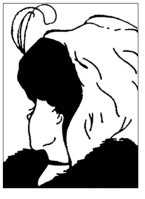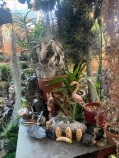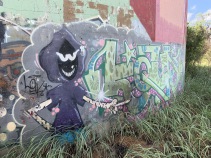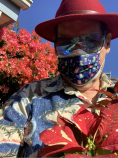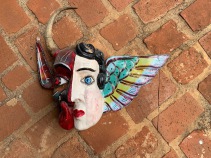the poetics of orthobionomy
–– a 'book' of beginnings ––
Coming Soon
Unphased Beyond
Progress has been suspended due to debilitating illness. If you want TMI about that, it can be found HERE. Along with thoughts about thriving with chronic "illness". In my case there is a trinity, 3 in 1: Chronic Fatigue, Atypical (Vestibular?) Migraine in Status Migrainosis, and Ulcerative Colitis (Pancolitis). Taking prednisone until inflammations calmed down and the hypomanic side effect of the steroid pressures up the system in some challenging ways.
Pick this up on the Collywobbles page.
The Blind Man And The Elephant
who went to see the elephant (Though all of them were blind),
that each by observation, might satisfy his mind.
The first approached the elephant, and, happening to fall,
against his broad and sturdy side, at once began to bawl:
"God bless me! but the elephant, is nothing but a wall!"
The second feeling of the tusk, cried: "Ho! what have we here,
so very round and smooth and sharp? To me tis mighty clear,
this wonder of an elephant, is very like a spear!"
The third approached the animal, and, happening to take,
the squirming trunk within his hands, "I see," quoth he,
the elephant is very like a snake!"
The fourth reached out his eager hand, and felt about the knee:
"What most this wondrous beast is like, is mighty plain," quoth he;
"Tis clear enough the elephant is very like a tree."
The fifth, who chanced to touch the ear, Said; "E'en the blindest man
can tell what this resembles most; Deny the fact who can,
This marvel of an elephant, is very like a fan!"
The sixth no sooner had begun, about the beast to grope,
than, seizing on the swinging tail, that fell within his scope,
"I see," quothe he, "the elephant is very like a rope!"
And so these men of Indostan, disputed loud and long,
each in his own opinion, exceeding stiff and strong,
Though each was partly in the right, and all were in the wrong!
So, oft in theologic wars, the disputants, I ween,
tread on in utter ignorance, of what each other mean,
and prate about the elephant, not one of them has seen!
You can always come up with other ways of looking at things. That's what the Phases gives us, different ways to approach the Body, different portals, differnt perspectives.
Orthobionomy clarifies the bond between self, other, and world.
The Principle of Reciprocity: Care of the Other through Care of the Self: Care of the Self through Care of the Other.

